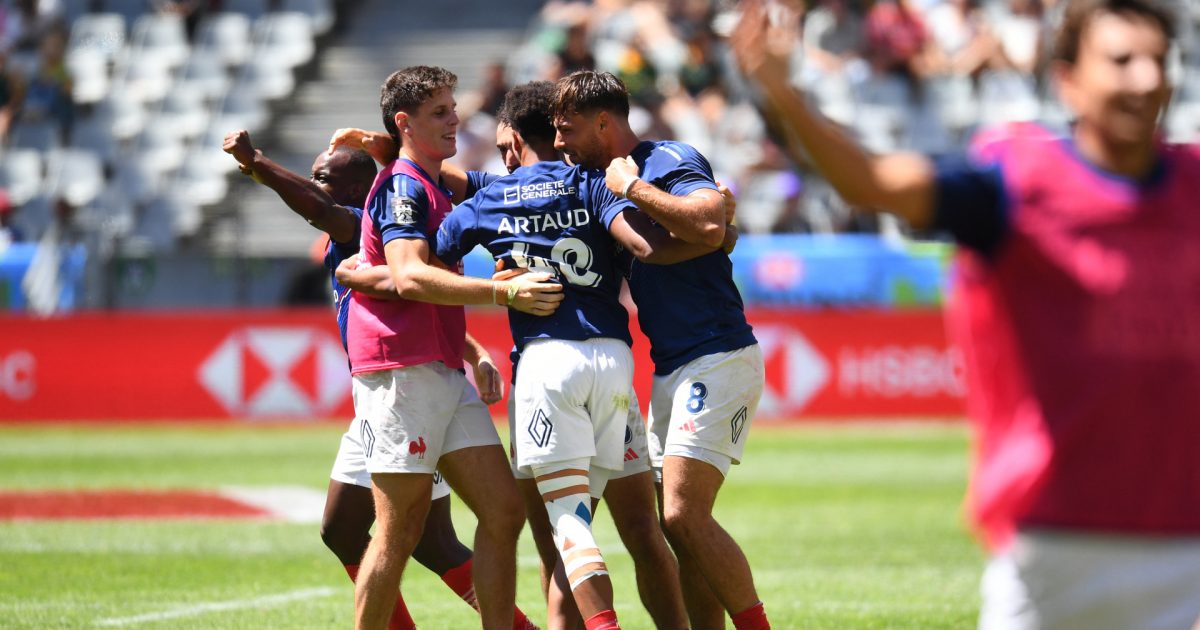Watch: The ice-cold winner that knocked Fiji out of Cape Town title race

Enahemo Artaud broke Fijian hearts on Sunday afternoon with a clutch sideline conversion to hand France a dramatic 19-17 win in the SVNS Cape Town semi-finals. Fiji were looking to repeat their Dubai Sevens heroics with another title, but they’re instead let to battle it out for third.
France and Fiji had already played out a thriller during the 2024/25 HSBC SVNS Series season after meeting in the quarter-final stage in Dubai. The Fijians stole that knockout showdown with a runaway try in the 15th minute, with not much separating the two teams that day.
It was a very similar story in the Western Cape over the weekend, but instead, it was France’s time to claw their way back from the brink of defeat. Simon Desert was one of France’s heroes in that semi-final clash, but the defining moment rested on the shoulders of a youngster.
Catch up on the action from the HSBC SVNS Series live on RugbyPass TV, which you can sign up for HERE.
After recording two solid wins during the pool stage, Fiji appeared to be at their best. They started their quest for SVNS Cape Town glory with a stunning 70-7 demolition of newly promoted Uruguay and a five-point win over Great Britain.
With a new competition format in Cape Town sending the top-ranked side in each pool directly to the semi-finals, those two results were all Fiji needed to secure their place in the final four. As for France, they had beaten the USA and New Zealand.
That set the stage for an enthralling knockout clash.
Celian Pouzelgues and Liam Delamare scored first-half tries for the French, while George Bose ensured Fiji wouldn’t go into the half empty handed on the scoreboard. Ikikimi Vunaki scored in the ninth minute to make it anyone’s game going into the championship minutes.
Iowane Teba raced away in the 13th minute to seemingly snatch it for Fiji, but France didn’t throw in the towel as Desert ended up striking back with a long-range effort. But with the scores locked at 17-all and with time up on the clock, it all came down to one last play.
Artaud, who was playing in only his second SVNS Series event, lined up a shot at goal from the left touchline. As thousands at DHL Stadium watched on, the Frenchman hit the ball perfectly as it sailed through the uprights to book France’s spot in the big dance.
What a finish for @France7s 🔥
Simon Désert & Enahemo Artaud make some big moves right at the death 🤯#HSBCSVNS #HSBCSVNSCPT pic.twitter.com/rpePCKktqb
— HSBC SVNS (@SVNSSeries) December 8, 2024
“The job’s not done yet,” William Iraguha said on RugbyPass TV after the semi-final. As France had shown during their run to the overall SVNS Series title last season, this team has set the bar high as they continue to chase silverware on the global sevens circuit.
As for Fiji, they were left to scrap it out with Spain, who had put up a valiant fight against tournament hosts South Africa. Eduardo Lopez capped off a solid start by Espana with a try in the fifth minute, and playmaker Alejandro Laforga also got on the scoresheet.
Zain Davids scored with a sensational effort in the eighth minute to see the Blitzboks trail by seven points at the break. The second term was one-way traffic as South Africa took control, with Shilton van Wyk standing out during a series of game-changing passages.
Van Wyk and Tristan Leyds both crossed for five-pointers as the Blitzboks registered a 19-12 win. Spain had made their first-ever men’s Cup Final on the SVNS Series the weekend before in Dubai, and they’d come incredibly close to repeating that effort in Cape Town.
Rugby’s best of the best, ranked by experts. Check out our list of the Top 100 Men's Rugby Players and let us know what you think!















































































